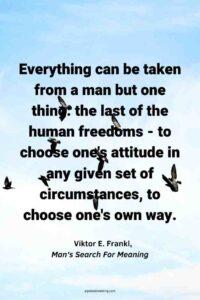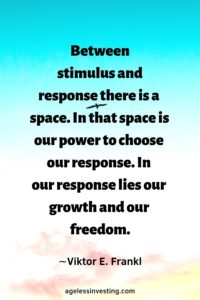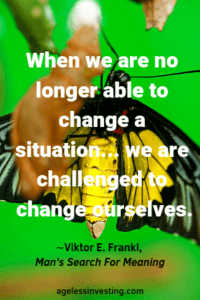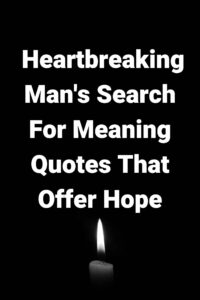What’s your “why”?
In a world that often feels chaotic, how do we find the strength to endure and discover purpose?
Viktor Frankl’s timeless work, Man’s Search For Meaning, a testament forged in the unimaginable suffering of Nazi concentration camps, offers not easy answers, but a powerful path forward.
We’ve gathered 43 unforgettable Man’s Search For Meaning quotes with page numbers, each a beacon illuminating the power of choice, responsibility, love, and the enduring quest for purpose that defines our lives.
His insights illuminate the extraordinary resilience of the human spirit and the strength derived from discovering purpose, even amid immense pain.
Quest for Meaning: Frankl’s Core
At the heart of Frankl’s logotherapy lies the assertion that humanity’s primary drive is the discovery and pursuit of what individuals find personally meaningful. He contends that life itself constantly poses questions, demanding an active, responsible engagement to unearth our unique purpose.

“He Who Has a Why to Live For Can Bear Almost Any How.”
(Speaker: Friedrich Nietzsche (quoted by Frankl), Man’s Search For Meaning, Page IX)
Frankl frequently invokes Nietzsche to establish a cornerstone of logotherapy: a defined purpose (the “why”) empowers individuals with the inner fortitude to endure even the most extreme hardships (the “how”).
“Ultimately, man should not ask what the meaning of his life is, but rather must recognize that it is he who is asked. In a word, each man is questioned by life; and he can only answer to life by answering for his own life; to life he can only respond by being responsible.”
(Speaker: Viktor E. Frankl, Man’s Search For Meaning, Page 109)
Frankl inverts the traditional search for meaning. He argues that life itself interrogates us, requiring each person to answer through responsible actions and commitments, thus forging their purpose.
“…it did not really matter what we expected from life, but rather what life expected from us. We needed to stop asking about the meaning of life, and instead to think of ourselves as those who were being questioned by life — daily and hourly. Our answer must consist, not in talk and meditation, but in right action and in right conduct.”
(Speaker: Viktor E. Frankl, Man’s Search For Meaning, Page 77)
This passage emphasizes a critical shift in perspective, vital for survival and finding meaning, particularly under duress. Purpose arises not from personal desires, but from actively and ethically responding to life’s ongoing challenges.
“Life ultimately means taking the responsibility to find the right answer to its problems and to fulfill the tasks which it constantly sets for each individual.”
(Speaker: Viktor E. Frankl, Man’s Search For Meaning, Page 77)
A meaningful life, according to Frankl, is built upon active engagement and responsibility. It necessitates confronting life’s “problems” and diligently undertaking the unique “tasks” presented to each person.
“Questions about the meaning of life can never be answered by sweeping statements. “Life” does not mean something vague, but something very real and concrete, just as life’s tasks are also very real and concrete. They form man’s destiny, which is different and unique.”
(Speaker: Viktor E. Frankl, Man’s Search For Meaning, Page 77)
Frankl defines meaning not as an abstract ideal but as something tangible, discovered in the specific, individual challenges and responsibilities that shape one’s unique “destiny.”
“The meaning of life is to help others find the meaning of theirs.”
(Speaker: Viktor E. Frankl, Man’s Search For Meaning, Page 165)
This distillation of logotherapy’s core suggests that personal meaning often blossoms through self-transcendence, by contributing to the purpose and well-being of others.
“Life is not primarily a quest for pleasure, as Freud believed, or a quest for power, as Alfred Adler taught, but a quest for meaning. The greatest task for any person is to find meaning in his or her life.”
(Speaker: Viktor E. Frankl, Man’s Search For Meaning, (Principle discussed, page may vary)
Frankl grounds his theory in the “will to meaning,” which he posits as the fundamental human motivation, surpassing Freudian pleasure or Adlerian power. This quest, he asserts, is life’s most crucial undertaking.
“…what they considered ‘very important’ to them now, 16 percent of the students checked ‘making a lot of money’; 78 percent said their first goal was ‘finding a purpose and meaning to my life.’”
(Speaker: Viktor E. Frankl, Man’s Search For Meaning, (Referring to a survey), Page 100)
Citing survey data, Frankl illustrates the innate human yearning for purpose, which often outweighs materialistic desires, thus validating his focus on the will to meaning as a primary drive.
“People have enough to live by but nothing to live for; they have the means but no meaning.”
(Speaker: Viktor E. Frankl, Man’s Search For Meaning, Page 140)
This sharp diagnosis points to the “existential vacuum” of modern times. Frankl observes that material well-being (“means”) devoid of a guiding purpose (“meaning”) breeds emptiness and despair.
This inherent human need for meaning, Frankl discovered, finds its most profound test and perhaps its clearest revelation when confronted by unavoidable suffering.
Suffering’s Meaning: Pain’s Power
Frankl does not glorify pain but contends that even inescapable suffering can yield meaning. The attitude adopted towards hardship, he argues, can transform suffering into a testament to the human spirit’s capacity for resilience and purpose.
“There is only one thing I dread: not to be worthy of my sufferings.”
(Speaker: Fyodor Dostoevsky (quoted by Frankl), Man’s Search For Meaning, Page 66)
By quoting Dostoevsky, Frankl emphasizes that the true challenge of suffering is not the pain itself but the internal struggle to maintain one’s dignity and moral compass in the face of it.
“If there is meaning in life at all, then there must be meaning in suffering. Suffering is an ineradicable part of life, even as fate and death. Without suffering and death human life cannot be complete.”
(Speaker: Viktor E. Frankl, Man’s Search For Meaning, Page 67)
Frankl asserts that suffering is an unavoidable aspect of existence. Therefore, he reasons, a complete understanding of life’s meaning must also encompass the potential for purpose found within such hardships.
“In some way, suffering ceases to be suffering at the moment it finds a meaning, such as the meaning of a sacrifice.”
(Speaker: Viktor E. Frankl, Man’s Search For Meaning, Page 113)
This core logotherapeutic insight reveals that the experience of suffering can be fundamentally altered. When pain is imbued with purpose, such as in a meaningful sacrifice, its crushing weight can be lessened.

“What is to give light must endure burning.”
(Speaker: Viktor E. Frankl, Man’s Search For Meaning, (Principle discussed, page may vary))
This evocative metaphor suggests that creating something of value or offering meaning to others (“to give light”) inherently involves personal cost and enduring hardship (“must endure burning”).
“An abnormal reaction to an abnormal situation is normal behavior.”
(Speaker: Viktor E. Frankl, Man’s Search For Meaning, Page 20)
Frankl reframes psychological responses to extreme trauma. In the profoundly “abnormal situation” of the concentration camps, behaviors like emotional apathy were “normal” and necessary for survival.
“But there was no need to be ashamed of tears, for tears bore witness that a man had the greatest of courage, the courage to suffer.”
(Speaker: Viktor E. Frankl, Man’s Search For Meaning, Page 78)
Challenging stoic ideals, Frankl posits that tears are not a sign of weakness in the face of suffering but evidence of the profound “courage to suffer” and to feel deeply.
“Once an individual’s search for a meaning is successful, it not only renders him happy but also gives him the capability to cope with suffering.”
(Speaker: Viktor E. Frankl, Man’s Search For Meaning, Page 139)
A discovered meaning serves a dual purpose: it can lead to happiness and, crucially, it fortifies an individual with the inner strength required to confront and cope with suffering.
“…meaning is available in spite of – nay, even through – suffering, provided… that the suffering is unavoidable. If it is avoidable, the meaningful thing to do is to remove the cause, for unnecessary suffering is masochistic rather than heroic.”
(Speaker: Viktor E. Frankl, Man’s Search For Meaning, Page 147)
Frankl carefully distinguishes between finding meaning through suffering and finding meaning in suffering. Actively choosing to endure preventable pain is self-defeating, not noble.
“If on the other hand, one cannot change a situation that causes his suffering, he can still choose his attitude.”
(Speaker: Viktor E. Frankl, Man’s Search For Meaning, Page 147)
This articulates a central tenet: when external circumstances are fixed, the internal power to determine one’s response, the “choice of attitude,” remains an inviolable human freedom.

“I called to the Lord from my narrow prison and He answered me in the freedom of space. How much suffering there is to get through.”
(Speaker: Viktor E. Frankl, Man’s Search For Meaning, (Reflecting on Psalm 118:5), Page 89)
Drawing on scripture during his imprisonment, Frankl describes a deep spiritual experience in which, despite his physical confinement (“narrow prison”), he finds an expansive inner “freedom of space,” acknowledging the immense suffering yet to come.
This remarkable capacity to choose one’s inner stance, regardless of external pressures, Frankl identifies as the ultimate human freedom, the bedrock of a meaningful life.
Freedom of Attitude: Choice Rules
Frankl passionately affirms that even when all other liberties are extinguished, the inner freedom to choose one’s attitude toward fate remains. This choice is the wellspring of human dignity and the capacity for meaning.

“Everything can be taken from a man but one thing: the last of the human freedoms – to choose one’s attitude in any given set of circumstances, to choose one’s own way.”
(Speaker: Viktor E. Frankl, Man’s Search For Meaning, Page 66)
This seminal quote encapsulates Frankl’s philosophy. He argues that even amidst total deprivation, the power to determine one’s internal response, the “last of the human freedoms,” remains inviolable.
“It is the spiritual freedom – which cannot be taken away – that makes life meaningful and purposeful.”
(Speaker: Viktor E. Frankl, Man’s Search For Meaning, Page 67)
Frankl directly connects this unassailable “spiritual freedom,” the liberty to choose one’s inner bearing, to the very possibility of a meaningful and purposeful existence, regardless of external hardship.
“What man actually needs is not a tensionless state but rather the striving and struggling for a worthy goal, a freely chosen task.”
(Speaker: Viktor E. Frankl, Man’s Search For Meaning, Page 105)
Countering the pursuit of mere comfort, Frankl asserts that human fulfillment arises from engagement in a “striving and struggling” toward a self-determined, “worthy goal,” not from achieving a “tensionless state.”
“Freedom is in danger of degenerating into mere arbitrariness unless it is lived in terms of responsibleness. That is why I recommend that the Statue of Liberty on the East Coast be supplemented by a Statue of Responsibility on the West Coast.”
(Speaker: Viktor E. Frankl, Man’s Search For Meaning, Page 132)
Frankl argues that true freedom is not license but is intrinsically linked to responsibility. Without this conscious commitment, liberty can devolve into meaninglessness, prompting his symbolic call for a “Statue of Responsibility.”
“There is nothing conceivable which would so condition a man as to leave him without the slightest freedom.”
(Speaker: Viktor E. Frankl, Man’s Search For Meaning, Page 133)
This powerful assertion underscores the indestructible core of human agency. Frankl maintains that no matter how extreme the conditioning, a “slightest freedom”, the choice of attitude, always remains.
“the sort of person the prisoner became was the result of an inner decision, and not the result of camp influences alone”
(Speaker: Viktor E. Frankl, Man’s Search For Meaning, Page 66)
Frankl emphasizes individual agency even within the brutalizing camp system. He observed that the ultimate character of a prisoner was shaped by their “inner decision” regarding their attitude, not solely by external pressures.

“Between stimulus and response there is a space. In that space is our power to choose our response. In our response lies our growth and our freedom.”
(Speaker: Viktor E. Frankl, (Concept attributed, page varies))
This widely cited concept, essential to Frankl’s philosophy, pinpoints the locus of human freedom. It is in the “space” between an event and our reaction that we exercise our power to choose, enabling growth.
“Those who know how close the connection is between the state of mind of a man… and the state of immunity of his body will understand that the sudden loss of hope and courage can have a deadly effect.”
(Speaker: Viktor E. Frankl, Man’s Search For Meaning, Page 75)
Drawing on his observations in the camp, Frankl underscores the vital link between psychological resilience and physical survival. A “sudden loss of hope and courage,” a failure of chosen attitude, could precipitate physical decline.
This capacity for inner freedom and the search for meaning, Frankl finds, are often nourished and sustained by the power of love.
Love’s Power: Soul’s Anchor
Frankl identifies love as a primary human motivation and a powerful conduit to meaning. He discovered in the concentration camps that the contemplation of a loved one could provide immense spiritual strength and purpose, even in the absence of physical presence.
“Love is the only way to grasp another human being in the innermost core of his personality… By his love he is enabled to see the essential traits… he sees that which is potential… he makes these potentialities come true.”
(Speaker: Viktor E. Frankl, Man’s Search For Meaning, Pages 111-112)
For Frankl, love transcends mere emotion; it’s a profound act of understanding. It enables one to perceive and affirm the “innermost core” and untapped “potential” within another, thereby fostering their growth.
“For the first time in my life I saw the truth… The truth – that Love is the ultimate and highest goal to which man can aspire… The salvation of man is through love and in love.”
(Speaker: Viktor E. Frankl, Man’s Search For Meaning, Page 37)
During a brutal march, reflecting on his wife, Frankl experiences an epiphany: love is not just a feeling but the “ultimate and highest goal.” He concludes that human “salvation” is found “through love and in love,” offering meaning even when all else is stripped away.
“The second way of finding a meaning in life is by experiencing something — such as goodness, truth and beauty… or… by experiencing another human being in his very uniqueness — by loving him.”
(Speaker: Viktor E. Frankl, Man’s Search For Meaning, Page 111)
Frankl outlines three primary paths to meaning: creating work, experiencing values (like beauty or goodness), and, significantly, through experiencing another’s “uniqueness” by loving them.
This emphasis on meaning, responsibility, and love stands in contrast to a direct, often self-defeating, pursuit of happiness.
Happiness as Byproduct: Joy Sneaks
Frankl consistently teaches that happiness is not something to be chased directly. Instead, it often arises as an unintended consequence, a welcome side effect of engaging in meaningful activities or dedicating oneself to a purpose beyond the self.
“But happiness cannot be pursued; it must ensue. One must have a reason to ‘be happy.’ Once that reason is found, however, one becomes happy automatically.”
(Speaker: Viktor E. Frankl, Man’s Search For Meaning, Page 138)
Happiness, Frankl asserts, is not a goal to be achieved through direct pursuit but an outcome that “must ensue” once a person discovers a “reason to be happy,” a compelling purpose or meaning in their life.
“As we see, a human being is not one in pursuit of happiness, but rather in search of a reason to be happy… through actualizing the potential meaning inherent and dormant in a given situation.”
(Speaker: Viktor E. Frankl, Man’s Search For Meaning, Page 138)
The fundamental human drive, Frankl argues, is for meaning, not happiness. By “actualizing the potential meaning” within life’s situations, happiness may then follow as a natural consequence of purposeful engagement.
“Don’t aim at success… For success, like happiness, cannot be pursued; it must ensue… as the unintended side effect of one’s personal dedication to a cause greater than oneself… success will follow you precisely because you had forgotten to think about it”
(Speaker: Viktor E. Frankl, Man’s Search For Meaning, Page XIV (From Preface))
Frankl extends this principle from happiness to success. Both, he suggests, are not attainable through direct, self-focused effort but emerge as “unintended side effect[s]” of dedicating oneself to a larger cause or purpose.
“…our current mental-hygiene philosophy stresses the idea that people ought to be happy… Such a value system might be responsible for… the burden of unavoidable unhappiness is increased by unhappiness about being unhappy…”
(Speaker: Viktor E. Frankl, Man’s Search For Meaning, Page 114)
Frankl critiques the modern emphasis on the pursuit of happiness, warning that this “value system” can paradoxically exacerbate suffering by fostering shame or feelings of inadequacy in response to unavoidable human unhappiness.
Frankl’s philosophy champions the individual’s capacity for self-determination and the enduring value of lived experience in forging a meaningful existence.
Self & Legacy: You Last
Despite the most dehumanizing conditions, Frankl affirms the individual’s power to define themselves and derive meaning from their experiences. Our choices and the way we bear our suffering become an unassailable part of our legacy.
“Man does not simply exist but always decides what his existence will be, what he will become in the next moment.”
(Speaker: Viktor E. Frankl, Man’s Search For Meaning, Page 131)
Human existence, Frankl argues, is dynamic and self-created. Through continuous choices, individuals actively determine “what [their] existence will be,” shaping their being from moment to moment.
“We can predict the movements of a machine… But man is more than psyche.”
(Speaker: Viktor E. Frankl, Man’s Search For Meaning, Page 132)
Frankl distinguishes humans from mere mechanisms. While psychological or biological factors exert influence, the human spirit (“more than psyche”) possesses a transcendent freedom beyond deterministic prediction.
“A human being is not one thing among others; things determine each other, but man is ultimately self-determining.”
(Speaker: Viktor E. Frankl, Man’s Search For Meaning, Page 133)
This quote boldly champions human agency. Unlike objects (“things”) subject to external forces, Frankl asserts that individuals possess the ultimate capacity for “self-determining” their path and meaning.

“When we are no longer able to change a situation… we are challenged to change ourselves.”
(Speaker: Viktor E. Frankl, Man’s Search For Meaning, Page 112)
Frankl identifies the transformative potential within unalterable circumstances. When external change is impossible, the “challenge” shifts inward, creating an opportunity for spiritual growth and finding meaning through internal attitudinal shifts.
“No man should judge unless he asks himself in absolute honesty whether in a similar situation he might not have done the same.”
(Speaker: Viktor E. Frankl, Man’s Search For Meaning, Page 48)
Reflecting on the morally ambiguous choices made by prisoners, Frankl urges empathy. Before judging others, he insists on rigorous self-examination, acknowledging the power of extreme circumstances.
“Only slowly could these men be guided back to the commonplace truth that no one has the right to do wrong, not even if wrong has been done to them.”
(Speaker: Viktor E. Frankl, Man’s Search For Meaning, Page 91)
Frankl recognizes the challenging psychological path that survivors face in reclaiming their moral compass and breaking the cycle of wrongdoing, emphasizing the gradual return to the “commonplace truth” of universal ethical responsibility.
“Every human being has the ability to change at an instant.”
(Speaker: Viktor E. Frankl, Man’s Search For Meaning, Page 131)
This powerful assertion underscores Frankl’s belief in the constant human potential for transformation. He maintains that, regardless of past actions or present conditions, the freedom to choose a new attitude or path remains ever-present.

“What you have experienced, no power on earth can take from you.”
(Speaker: Viktor E. Frankl, Man’s Search For Meaning, Page 82)
Frankl emphasizes the indelible permanence of lived experiences, both joyful and traumatic. Once endured or achieved, these moments become an unassailable part of one’s inner history, contributing to identity and offering potential meaning.
“…procreation is not the only meaning of life, for then life itself would become meaningless, and something meaningless cannot be rendered meaningful merely by its perpetuation.”
(Speaker: Viktor E. Frankl, Man’s Search For Meaning, Page 119)
In dialogue with a despairing rabbi, Frankl argues that the meaning of life transcends mere biological continuity. He posits that if procreation were the sole source of purpose, countless individual lives would be rendered meaningless, a premise that logotherapy rejects.
Viktor Frankl’s insights, forged in the crucible of unimaginable hardship, assert that meaning is not an abstract ideal to be passively found, but a concrete potential to be actively forged through individual purpose, unwavering responsibility, the power of love, and the conscious attitude we choose when facing suffering. His words remain a powerful guide for anyone navigating life’s challenges and seeking enduring resilience and direction.

Lessons from Man’s Search for Meaning
What’s the heart of Man’s Search For Meaning? These enduring lessons distill Frankl’s profound wisdom:
- Knowing your “why” empowers you to bear almost any “how.”
- Your attitude in any given circumstance is your ultimate, inviolable freedom.
- Meaning can be discovered even within unavoidable suffering; it’s how you bear your burden that matters.
- Life constantly poses questions to you; answer through responsible action and proper conduct.
- Love offers the deepest way to grasp another’s essence and help them actualize their potential.
- Happiness and success are generally byproducts of a meaningful life, not primary objectives to be chased.
These insights offer guidance for navigating the human condition. If Frankl’s perspective resonates, you might also appreciate the themes of resilience and finding meaning in hardship explored in Elie Wiesel’s Night book quotes.
A Note on Page Numbers & Edition:
As with finding meaning in the face of adversity, specific page numbers for Man’s Search for Meaning can vary across editions. We referenced these page numbers from the Beacon Press, 2006 paperback edition. Always consult your specific copy to ensure accuracy.

Do you know what page this quote is on “when being confronted with a hopeless situation, that man is given a last opportunity to fulfil a meaning to realize even the highest value, to fulfil even the deepest meaning, the meaning of suffering”
I am looking for my copy of the book, but it is in the first paragraph under the subheading “LOGOTHERAPY IN A NUTSHELL
THE MEANING OF SUFFERING.” I will add the page number when I find my book.
Thank you, Martina!